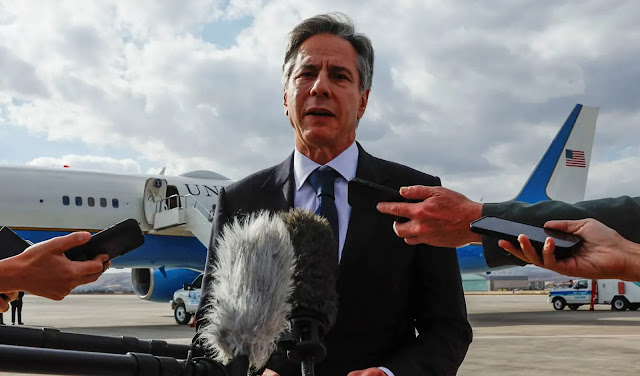
AMERICA – Posters of people held hostage by Hamas, affixed to light poles and buildings in cities and on college campuses around the U.S., are being torn down, leading to confrontations captured on social media and further inflaming the debate over the war in the Middle East.
Family members of hostages and antisemitism organizations said that removing the posters, meant to ensure their captured loved ones are not forgotten, is worsening already high tensions in the U.S. since Hamas’ initial Oct. 7 terror attack that left 1,400 people dead and 239 kidnapped.
“Frankly speaking, I don’t understand why people are doing this. My daughter was taken as a hostage by a terrorist group. You’re doing a very bad act,” said Eitan Gonen, 55, who lives in Israel.
Romi Gonen, 23, was at a music festival when she was abducted.
“It really upsets me. I don’t understand the logic of ripping the posters off of walls,” Eiten Gonen said.
Tearing the photos off telephone poles and other public-facing surfaces has become more frequent in recent weeks, following Israel’s retaliatory airstrikes and ground invasion, which Gaza health officials say have killed more than 10,800 people.
“The removal of these posters is deeply and solely rooted in antisemitism. We think it’s coldhearted and evil,” said Liora Rez, executive director of the nonprofit group StopAntisemitism.
Although most incidents have occurred on public property, the New York Police Department said officers arrested two people Wednesday night on suspicion of criminal mischief for allegedly tearing down kidnap posters on private property.
The NYPD is also looking for two women who allegedly assaulted a 41-year-old woman Thursday night in a possible hate crime after she engaged with them as they were removing flyers from a light pole on the Upper West Side.
As the women and the victim got into a dispute, the two assaulted her, “forcibly ripping off her Star of David necklace that was around her neck” and knocked her cellphone out of her hand, police said.
From California to Florida, incidents are appearing on social media nearly every day, as people continue to express their feelings by putting the posters up or ripping them down. Some people are even standing in front of the posters to prevent others from grabbing them.
“We are seeing it everywhere, but it’s most prevalent in New York City,” Rez said.
In Los Angeles, cellphone video captured a confrontation between a University of Southern California student and two people who were discarding hostage posters in a trash can.
A similar incident occurred in Massachusetts, where people were recorded removing posters in public, according to NBC Boston. In Florida, a dentist was fired after a video surfaced of him tearing down posters of kidnapped Israelis.
A display of hostage photos at the University of Minnesota’s student center has been damaged multiple times, NBC affiliate KARE in Minneapolis reported.
Conversely, about 200 volunteers put up thousands of missing posters across Seattle.
The issue has also reached the White House. Press secretary Karine Jean-Pierre initially sidestepped the issue in response to a question from an NBC News reporter.
After she left the podium, she issued a statement. “As a result of the Hamas terrorist attacks, communities and families are grieving,” Jean-Pierre said on X. “For the past month, the families of those who have been taken hostage have lived in agony. Tearing down pictures of their loved ones — who are being held hostage by Hamas — is wrong and hurtful.”
Some call the posters “street art” while, others dismiss it as pro-Israeli propaganda. When asked by people shooting cellphone video why they are removing the posters, those doing it often ignore the question or say they are cleaning up the area.
Jaylani Hussein, executive director of the Minnesota chapter of the Council on American-Islamic Relations, said people are frustrated by the lack of a cease-fire that would allow more aid into Gaza. But removing the flyers is not a way to ensure it happens.
“It’s not helpful at all. The attention should be back on the children and civilians being killed right now,” Hussein said. “We need to keep focused on the fact that many of those hostages could be killed. If we care about the sanctity of life, we should be united with the call for a cease-fire.”
Gal Gilboa-Dalal, 29, and his younger brother, Guy Gilboa-Dalal, 22, were at the music festival when they were separated; Guy was kidnapped. Gal said people need to think of those abducted as their family or friends.
“Israel is far away from here and people don’t try to understand it. To them, these are just pictures or posters, but they must realize the hostages are human beings,” said Gal Gilboa-Dalal, who lives near Tel Aviv and recently visited the U.S. to draw attention to his missing brother.
Two Israeli artists, Dede Bandaid and his partner, Nitzan Mintz, said they started hanging posters of hostages in New York City, a movement that took off across the country. They said all the hostages should be set free.
“I cannot live with myself knowing that this 12-year-old is now in the hands of Hamas,” said Mintz, pointing to a photo of a hostage during an interview with NBC New York.
Julie Rayman, managing director of Policy and Political Affairs for the American Jewish Committee, said the idea that removing the photos is a political statement is “horrific.”
“Just because it’s free speech doesn’t mean it’s not hateful. It doesn’t make it OK in my mind,” Rayman said. “It’s antisemitism. These are innocent people, elderly people and children.”

